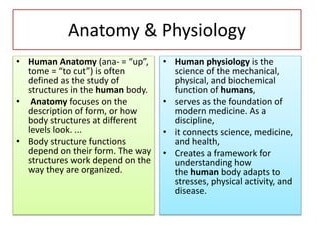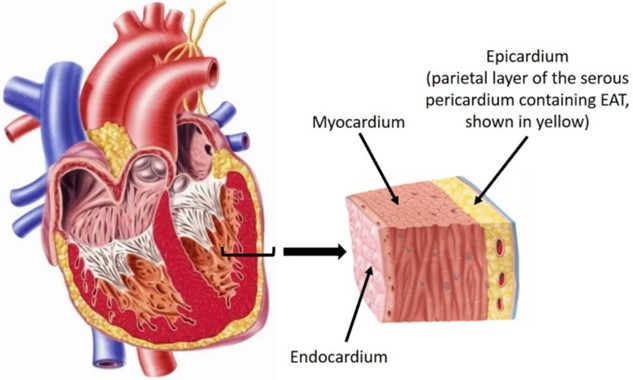Anatomy and physiology are difficult to separate because:
Physiological functions depend on anatomical structures.
Our understanding of physiology is changing more than our understanding of anatomy.
Body parts take up space.
Physiological functions in an organism are ongoing.
The Correct Answer is A

This is because anatomy and physiology are closely related branches of biology that study the structure and function of living organisms respectively.
Anatomy describes the shape, size, location, and relationships of body parts, while physiology explains how those parts work together to maintain life.
For example, the anatomy of the heart determines how it pumps blood, and the anatomy of the lungs determines how they exchange gases.
Choice B is wrong because our understanding of both anatomy and physiology is constantly changing as new discoveries are made in the field of biology.
Choice C is wrong because body parts take up space regardless of their physiological functions.
Choice D is wrong because physiological functions are not limited to an organism, but can also occur at the cellular, tissue, organ, and system levels.
Nursing Test Bank
Naxlex Comprehensive Predictor Exams
Related Questions
Correct Answer is C
Explanation
The endocrine system may have a longer-lasting effect than the nervous system because the hormones it produces can circulate in the bloodstream for a long time and affect many organs and tissues.
The nervous system, on the other hand, uses nerve impulses and neurotransmitters for communication, which are faster but more short-lived.
Choice A is wrong because the endocrine system is essential to life.
It regulates many vital functions such as metabolism, growth, reproduction, mood, sleep, and blood pressure.
Choice B is wrong because the endocrine system takes longer than the nervous system to deliver its messages.
The hormones have to travel through the bloodstream to reach their target cells, while the nerve impulses can travel along the nerve fibers at high speeds.
Choice D is wrong because the endocrine system does use receptors.
The hormones bind to specific receptors on the target cells to trigger a response.
Correct Answer is B
Explanation

The endocardium is the thin inner lining of the heart chambers and also forms the surface of the heart valves.
Some possible explanations for the other choices are:
Choice A is wrong because the pericardium is the sac that surrounds the heart and consists of two layers: the fibrous pericardium and the serous pericardium.
Choice C is wrong because the myocardium is the thick middle layer of muscle that allows the heart chambers to contract and relax to pump blood to the body.
Choice D is wrong because epicardium is another name for the visceral layer of the serous pericardium that is fused to the heart and is part of the heart wall.
Whether you are a student looking to ace your exams or a practicing nurse seeking to enhance your expertise , our nursing education contents will empower you with the confidence and competence to make a difference in the lives of patients and become a respected leader in the healthcare field.
Visit Naxlex, invest in your future and unlock endless possibilities with our unparalleled nursing education contents today
Report Wrong Answer on the Current Question
Do you disagree with the answer? If yes, what is your expected answer? Explain.
Kindly be descriptive with the issue you are facing.
